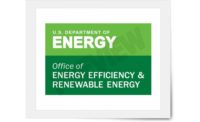The U.S. Department of Energy (DOE) announced $35 million in funding that will help slash carbon emissions and scale up the volume and efficiency of renewable biofuel. The 15 awarded research projects are housed at colleges, universities, and labs across nine states and will advance new technologies to decarbonize biorefining processes used across the energy, transportation, and agriculture sectors. The funding awards are supported by DOE’s Advanced Research Projects Agency-Energy (ARPA-E). These investments in advancements in clean energy technology will help America achieve the Biden-Harris administration’s goal of 100% clean energy economy and net-zero emissions by 2050.
“Biofuel is a powerful tool in the clean energy toolkit that has immense potential to power our ships and airlines with zero carbon emissions,” said Secretary of Energy Jennifer M. Granholm. “DOE is investing in research to reduce emissions and maximize the availability of efficient biofuel as we strive to reach President Biden’s net-zero carbon goals.”
Biofuel, including ethanol, biodiesel, and other products derived from organic material (biomass), is almost exclusively produced via a conversion process called fermentation. These fermentation processes create carbon as a byproduct, with some processes wasting more than 1/3 of this carbon as CO2 emissions. As a result, there is a critical need to create new pathways for biofuel conversion that reduces carbon waste, prevents the loss of CO2 emissions, and in turn, maximizes the amount of renewable fuel a conversion process yields.
The 15 teams receiving awards through ARPA-E’s “Energy and Carbon Optimized Synthesis for the Bioeconomy” (ECOSynBio) program will work on the following methods to optimize biofuel manufacturing:
- Carbon-optimized fermentation strains that avoid CO2 waste;
- Engineered organisms that can use a mix of different sources of energy and carbon and avoid evolving CO2;
- Biomass-derived sugar or carbon oxide gas fermentation with internal CO2 recycling;
- Cell-free carbon-optimized biocatalytic biomass conversion and/or CO2 use; and
- Cross-cutting carbon-optimized bioconversion methods that have the potential for high-impact emissions reductions.
“California is home to many of the world’s leading research institutions, and their innovations will be critical to building a clean energy economy,” said U.S. Senator Alex Padilla. “As we work to mitigate the impacts of climate change, we need to keep investing in the next generation of clean fuel technology. I’m proud to see California’s continued leadership in the development of these clean energy technologies and applaud the Biden administration for their ongoing commitment to combat climate change.”
“Like the Biden Administration, I am committed to investing in the technologies of tomorrow to drive us toward a more eco-friendly and sustainable future. The announcement that Ohio State University will receive over $1.6 million from the Department of Energy’s cutting-edge ARPA-E program is further proof that President Biden and Vice President Harris are determined to make this dream a reality," said U.S. Representative Joyce Beatty. “As Representative of Ohio’s Third Congressional District, I will continue to work with the White House to address the impact of climate change—and I am confident that the groundbreaking research being done by central Ohio scientists will go a long way in pushing that important work forward.”
“The University of Washington is building on its distinguished record of being a local, national, and global leader on developing the scientific innovations necessary to aggressively take on climate change,” said U.S. Representative Pramila Jayapal. “I am grateful that the Biden-Harris Administration is prioritizing bold climate action while immediately centering environmental justice and investing in our institutions of higher education so they can lead the way in protecting our planet for generations to come. I look forward to continuing to work with the new administration to create green jobs, achieve a renewable energy future, and guarantee clean air, safe drinking water, and public lands for all.”
“I am proud of today’s announcement to support the National Renewable Energy Lab’s continued work to improve efficiency in the development of alternative fuels," said U.S. Representative Ed Perlmutter. “NREL is the world’s premier lab for developing clean and renewable energy technologies and their work is helping mitigate the causes of climate change and move toward a net-zero emissions future.”
“I want to congratulate a company in my district, LanzaTech, who has been awarded funding by the Department of Energy’s Advanced Research Projects Agency-Energy. The award will help this woman-led small business advance their development of innovative technologies to fight climate change. Through a competitive selection process, this project was chosen for its potential to transform the way energy is used through technology that can be meaningfully advanced with a small amount of funding over a defined period of time,” said U.S. Representative Jan Schakowsky. “Specifically, LanzaTech will create technology to enable direct conversion of carbon dioxide (CO2) to ethanol, a building block for low carbon intensity fuels and chemicals, at 100% carbon conversion efficiency to products. Our nation’s history is defined by discovery, ingenuity, and innovation, which leads to job growth, economic development, and technology that has the potential to improve the world. Supporting small businesses like LanzaTech and other innovators in my district and around the Chicagoland area will always be a top priority for me.”
The awardees are:
- INvizyne Technologies, Inc. (Monrovia, California)
- LanzaTech, Inc. (Skokie, Illinois)
- Massachusetts Institute of Technology (Cambridge, Massachusetts)
- National Renewable Energy Laboratory (Golden, Colorado)
- Ohio State University (Columbus, Ohio)
- Stanford University (Stanford, California)
- The Wyss Institute at Harvard University (Boston)
- University of Wisconsin-Madison (Madison, Wisconsin)
- University of Delaware (Newark, Delaware)
- University of California, Davis (Davis, California)
- University of California, Irvine (Irvine, California)
- University of Minnesota (Minneapolis, Minnesota)
- University of Washington (Seattle, Washington)
- ZymoChem, Inc. (San Francisco)* Two awards
Read more about the winning projects HERE.
Find more information on the ECOSynBio funding opportunity HERE. Details on how to apply for funding through ARPA-E programs can be found on ARPA-E eXCHANGE.




